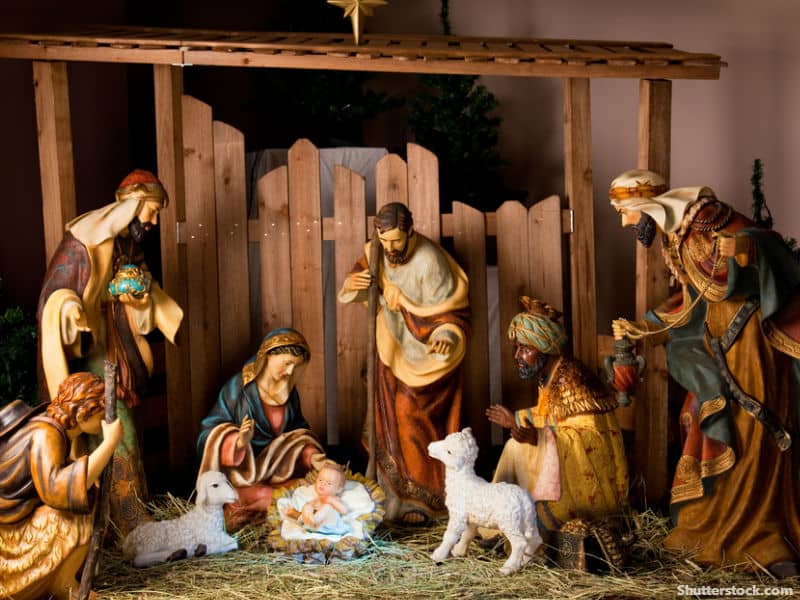
For Christian families, it may be time to finally separate Christ from Christmas.
We’ve all heard the slogan, “Keep Christ in Christmas.” It’s on bumper stickers and church signs all over the country during the winter months, and is used as a defensive mantra by those fearing a worsening war on Christmas.
But that slogan is wrong. Christ doesn’t need to be kept in Christmas. In fact, Christmas has become far too small a day for the Son of God.
The word, “Christmas,” is the shortened form of “Christ’s mass,” and has traditionally described the annual celebration of the birth of Jesus Christ. It is a day marked by feasts, special church services, and re-enactments of the nativity scene.
But somewhere along the way, Christmas got tangled up with a host of other pagan and capitalist traditions. This isn’t necessarily a bad thing. A Christian can sanctify all of the trappings of Christmas, trees and gifts and Yule logs and all, by holding the correct mindset—that all of these things are a part of the festivities surrounding the birth of Christ, and not the central objects of adoration.
The problem, though, is that these trappings do overwhelm the celebration of Christ for many. In the hustle of the season, in the fun of decorating, and even in the quiet glow of the firelight on Christmas Eve, Christ is being forgotten in lieu of manmade tradition.
And so at some point, we have to ask ourselves: does Jesus matter?
The question is a jarring one for many Christians. It gives us pause, holding up a mirror that may reflect something quite uncomfortable: the fact that our Christmases would be celebrated in exactly the same manner, even if Christ had never existed.
And so we realize that something needs to change.
And that something isn’t continuing the futile struggle to “bring Christ into Christmas”. Those are now two wholly separate things—the secular, commercial Christmas, and the Christ-centered “Christ’s mass”.
So what can we do differently? How can we sanctify Christmas both in our own families, and in broader culture?
It’s simple. We need to begin looking inward rather than outward.
“Christ’s mass,” is still one of the most important dates on the Christian liturgical calendar. That has not, and will not ever change. It doesn’t matter what “Christmas” has become—the reason for Christmas remains the same for the Christian Church.
Let it be so for your own family. Go ahead and enjoy the usual Christmas traditions with gusto—after all, it truly is the most wonderful time of the year. But keep the celebration of Christ’s birth a sacred event.
Pause in your holiday revelry. Take the time to separately acknowledge the birth of Christ, apart from the other elements of the holiday. Do this with your family, so that your children can learn to see the importance of their Savior’s humble beginnings, even against the background noise of Christmas.
Jesus didn’t come to earth to be merely stuck into a manger scene. Bring him out of the holiday traditions and into your living, breathing life through purposeful worship and praise during Christmas. Tell the story of Christ’s birth. Act it out. Attend a service. If Christ matters to you, put action to your words and bring food to the poor. Spend time with the homeless and the oppressed. Be kind.
Make the holiday a teaching opportunity—both for yourself, and for your family. Delve into the questions of why God chose to become man. Learn the historical context of the nativity story. Learn it so well that you can explain it to others effortlessly and compellingly.
Whatever you choose to do, keep it Christ-focused and separate—you can, in fact, have your cake and eat it, too, enjoying both sides of the Christmas season.
And once you do this? Stop there. Don’t put that “Keep Christ in Christmas” bumper sticker on your car. Don’t berate that Starbucks barista for giving you a cup that says “Happy Holidays”. Don’t ridicule the cashier who isn’t allowed to wish you a “Merry Christmas”.
Here’s why.
The demand that others keep Christ in Christmas does nothing. Worse, it hardens hearts against Christianity when Christians attempt to use threats and contempt and laws to manipulate others into having faith. That road doesn’t work.
Would Jesus do that? Or would he, rather, work in humility and respect, as scripture would seem to support?
If Jesus matters, Christians need to act like Him, and particularly so during Christmas. Remember that the life of Christ is the ultimate lesson in humility; He is God, the ultimate being, made lowly flesh. He spent time with the wicked and the poor and the sick and the outcast, respecting and loving them all. He was quick to listen, and slow to anger.
In fact, the only time He became angry or sharp was when he was confronted with oppressive organized religion!
We should invitational rather than confrontational. That is the essence of Christ. That is the Christmas spirit. The Christian Church would be well-served to uncurl from its defensive position and simply live out its faith.
That life and utter joy that comes from the celebration of Christ’s life will be a beacon to others, a bright, guiding light in a land obscured by snow.
So instead of wasting time trying to fear and guilt the secular community into including the theological aspects of Christmas in its celebrations, why not entice them through love and peace, pointing people toward the cross rather than dragging them there?
And all of this begins in our own hearts—when we make time to separate the celebration of Christ’s birth from the consumerism of Christmas, we show that Jesus matters to us. Otherwise, our admonitions to "bring Christ back to Christmas" ring hollow. If Christ truly matters to us, we'll live out the qualities that He embraced, and others will find those qualities beautiful enough to be drawn in.
So go and capture the true spirit of Christmas by dwelling on Christ’s birth, striving to be Christ-like in all that you do, and inviting the rest of the world to see the redemptive power of Jesus. Be the example. It is only in this that Christ and Christmas might truly become one.

